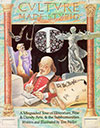Un gatto bianco, ch’era presidente
der circolo der libbero pensiero,
senti che er gatto nero,
libbero pensatore come lui,
je faceva la critica
riguardo a la politica
ch’era contraria a li principi sui.
–Giacchè nun badi a li fattacci tui,
–je disse er gatto bianco inviperito–
rassegnerai le proprie dimissioni
e uscirai dalle file der partito:
chè qui la poi pensa’ libberamente
come te pare a te, ma a condizzione
che t’associ a l’idee der presidente
e a le proposte della commissione!
–E’ vero, ho torto, ho aggito malamente. . . .–
rispose er gatto nero.
E pe’ resta’ ner libbero pensiero
da quella vorta nun penso’ piu’ gnente.—Trilussa
A white cat, who had been made the chair-cat
Of an Association for the Freedom of Thought,
Got news that a black cat,
A member of the same Association,
Would criticize his views
For he did not agree
With the white cat’s political principles.
–Since you won’t mind your own bloody business
– said the white cat to the black one in a rage –
You will resign – out of your own free will –
And leave our Party ranks for good:
’cause here you can think freely and as you please
So long as you accept the chair-cat’s views
And the Political Commitee’s proposals!
–It’s true, I’m wrong, what I’ve done wasn’t right . . .–
the black cat answered;
And to be allowed to remain Freethinker
From then on he never thought anything again.
[Translation supplied by Fabio Paolo Barbieri]








Recent Comments